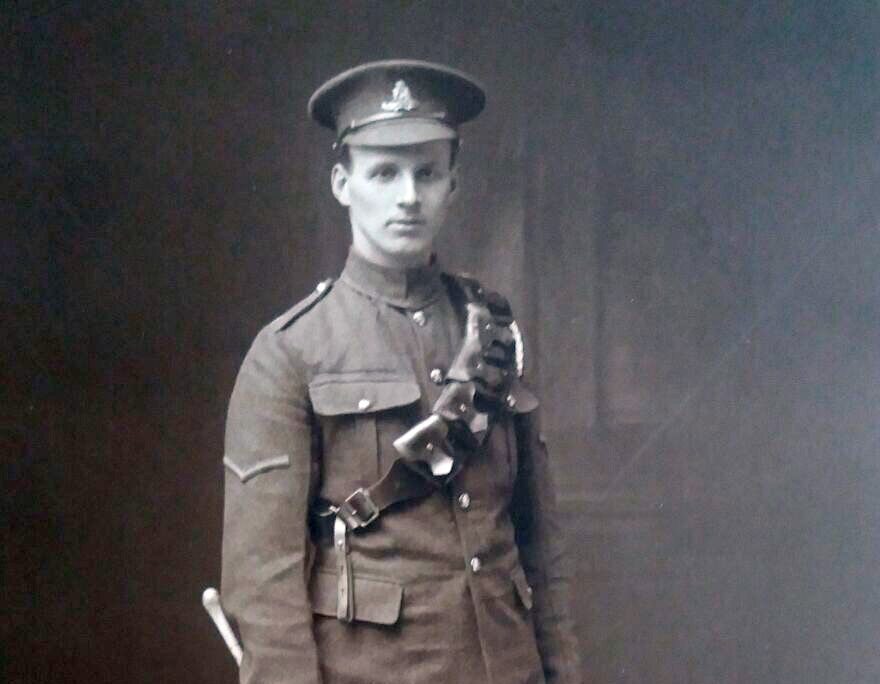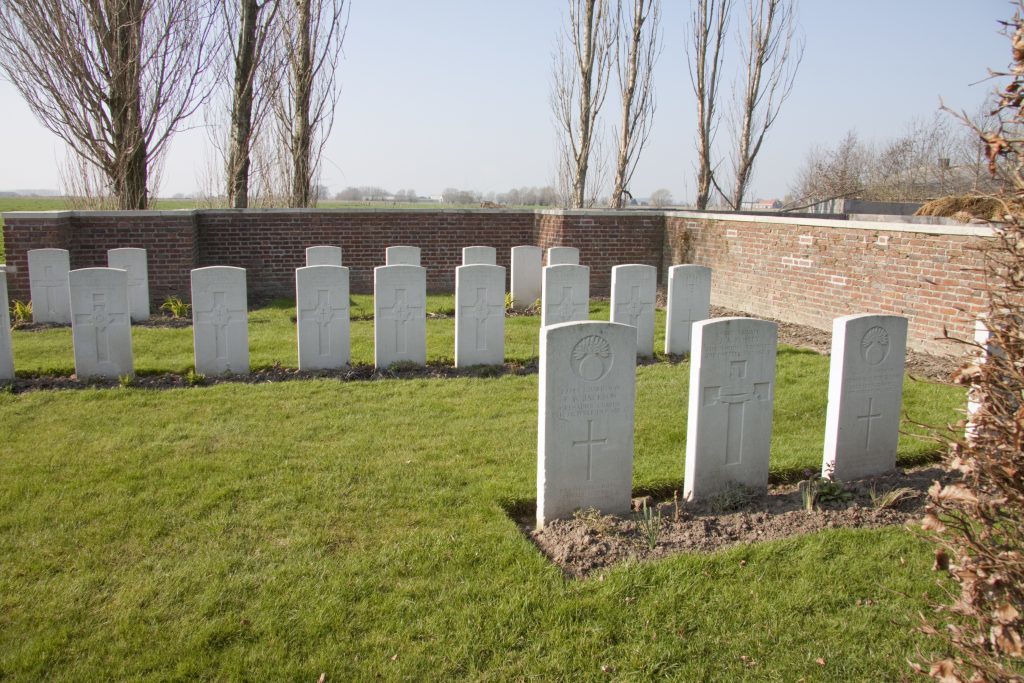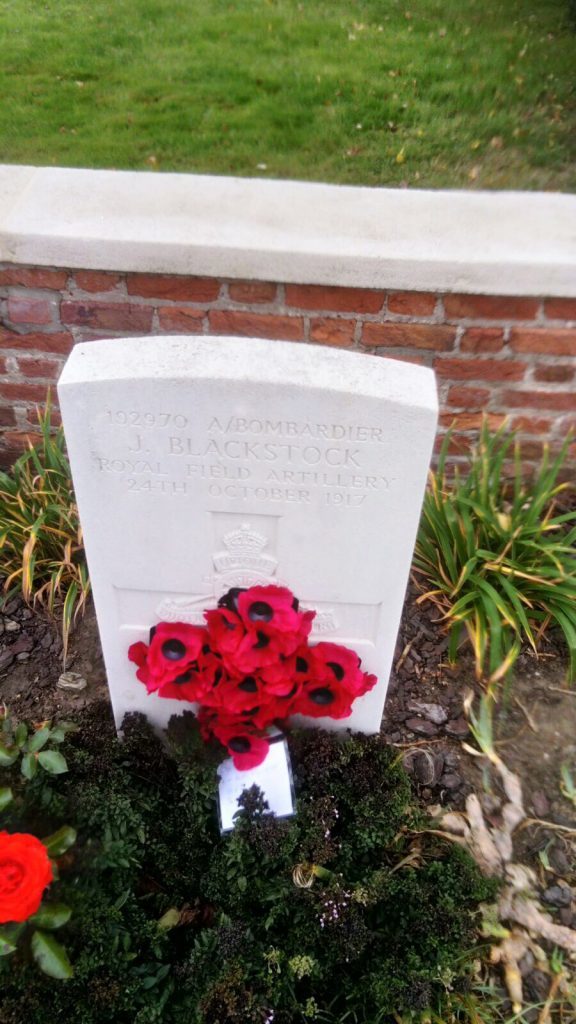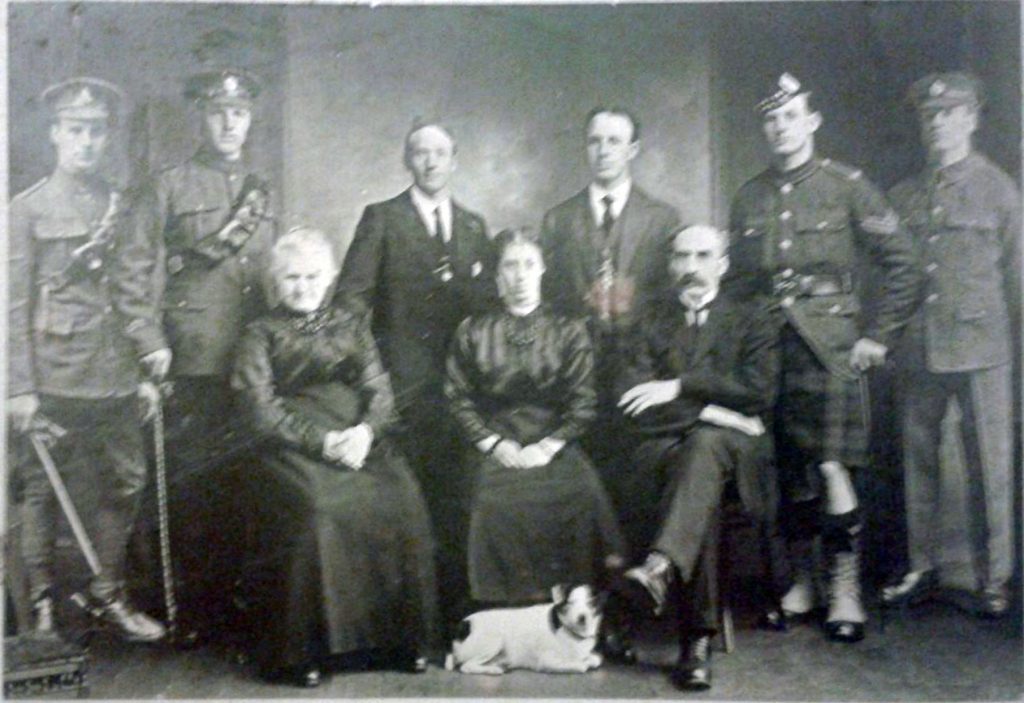
I stand by a white-as-bone headstone wondering what he would have been like.
What he would think about being buried here, so far from home?
It is not like I knew my great-great-uncle, Joseph Blackstock, or even those who mourned his death.
So why have I come – with my dad Iain and Uncle Tom – 600 miles to remember a man killed exactly 100 years before, on October 24, 1917, in the Third Battle of Ypres?
I have been trying to piece together Joe’s life since discovering he was buried here last year.
And it has led to this small graveyard, next to a farm, near the town of Ypres in Belgium.
Ruisseau Farm Cemetery isn’t what you’d expect from a graveyard built to honour those who fell in the carnage of the First World War.
There are not the row upon row of graves you find at the larger Commonwealth cemeteries.
In nearby Tyne Cot Cemetery – the largest Commonwealth War Graves Commission cemetery in the world – nearly 12,000 soldiers who fought in the fields of Flanders are buried.
There, the scale of the lives lost is both obvious but still unimaginable.
Crowds, including school children from across Europe who visit in the run up to Remembrance Day each year, move through the cemetery.
The graveyard of Ruisseau Farm is a quieter place. From a distance, a dog barking in a barn is the only sound.
Just 82 soldiers are buried here. Six remain unidentified, a century after their death.
There are no crowds, no school trips to this place. The register shows the last visitors came a few weeks before us.
One hundred years ago, there was no quiet, no peace, here or for miles around.
The farm was barely in the hands of Allied forces for two weeks when my great-great-uncle lost his life.
The fields around the town of Ypres had become the frontline within months of war being declared in 1914.
For three-and-a-half years, opposing forces fought and died to gain just a few yards of mud in the bloody trenches around the town.
By the end of the war, Ypres was all but flattened. At one point, Winston Churchill demanded it remain untouched, as a lasting memorial of the futility of war.
Places such as Ruisseau Farm were seized – and defended – in prolonged, attritional battles as thousands of men fought and died in the mud.
My great-great-uncle Joe, 29, was just one of them. Joe, from Motherwell, had just been promoted to acting Bombardier with B Battery in the Royal Field Artillery before the Third Battle of Ypres.
In his role, he would have been working to destroy German pillboxes and machine-gun nests with heavy shelling before an attack.
Dispatches from the battle – which raged from July to November 1917 – show a direct hit from enemy shelling killed Joe and four of his comrades on October 24, 1917.
If the exact site of his death wasn’t on the farm, it would have been nearby.
By that stage Ruisseau Farm – a temporary staging point to attack the Germans – was being used as a permanent base for those killed.
He and his four mates lie side by side in immaculate graves, respectfully tended by the Commonwealth War Graves Commission for the past 100 years.
Roses separate each lair. The grass is pristine.
Only Corporal Barr’s headstone is distinct from the others.
The Renfrew soldier’s stone includes a touching tribute from his dad John and mum Agnes to their “much loved only son”.
He was just 21 when he was killed.
That is not to say Joe’s death wasn’t mourned at home.
Named after his railway clerk dad Joseph, Joe Jnr was one of six brothers and one sister raised in the thriving industrial Lanarkshire town of Motherwell at the turn of the 20th Century.
While most his family worked on the railways and steelworks, Joe worked as a draper.
Four of the Blackstock brothers would be asked to do their duty when war broke out in 1914.
Only Joe wouldn’t return.
My own great-grandfather James – 30 at the time war was declared – somehow missed the cut. None of the family knows why.
A family picture, taken after the Armistice of November 11, 1918, show Joseph was still very much in his family’s thoughts.
The portrait appears to have used an early version of Photoshop to lovingly including Joe in the family shot alongside three other brothers proudly in uniform.
It is quite clear that, for them, Joe would never be forgotten.
Mysteriously, his brother Alexander is also cut into the picture for reasons that aren’t clear.
He would return to Motherwell after the fighting, dying in peacetime at the age of 78 in 1971.
We are the first Blackstocks to make the trip to Joe’s graveside.
Others have got close.
Less than 30 years after his death, his nephew Thomas – my grandfather – would pass nearby Ruisseau Farm as Allied forces drove the Nazis out of France and Belgium.
Ypres would survive the Second World War relatively unscathed.
While Joe’s life is a distant memory, the physical – and potentially lethal – legacy of his war is not.
Dirk Cardoen farms just five miles away from Joe’s artillery position.
Having been a dairy farmer for most his life, it was when Dirk began growing crops 20 years ago that his life became far more dangerous.
That’s when he started churning up unexploded shells, grenades and bombs at his farm.
“Cows are fine. You just leave them on the field. You don’t disturb the ground.
“But with potatoes you have to dig the ground up well.
“That’s when we started having problems.”
Dangerously, the potato and wheat fields around Dirk’s home still conceal uncounted tonnes of bombs, guns, projectiles and shells hurled during the First World War.
Some remain as deadly as the shell that killed Joe.
More than a billion shells were fired during the First World War and up to a third failed to explode.
“We’ve lost two farmers nearby in recent years to disturbed shells and bombs,” said Dirk.
“I was once ploughing the field in my tractor and got out to head across the field on foot when I heard a bang.
“I looked around and the underside of my tractor was destroyed by what looked like a shell.
“I was lucky.”
Around the back of his farm lie 15 munitions he’s discovered since August.
He points out some British shells.
Could they have been fired by Joe?
“Maybe, but there were a lot of people firing them at the time,” said Dirk.
He’s waiting on the Belgian bomb disposal unit, known as DOVO to remove them.
But he doesn’t know when they’ll come.
“They are very busy. I’m not the only one.”
The unit finds between 150 and 200 tonnes of munitions each year.
20 members of the DOVO team have been killed since it was formed in 1919.
Does Dirk hold the peril he faces farming today against people like Joe who fought here a century ago.
He said: “No, no, no. The people of Ypres are very glad the Allied soldiers fought here.
“It won’t be forgotten.”
Each night, crowds gather to hear the Last Post at the Menin Gate Memorial in Ypres.
The memorial is engraved with the names of 55,000 British and Commonwealth soldiers who never came home and whose bodies were never recovered.
From here, from the little graveyard where he lies buried, from 100 years on, my great-great uncle Joe seems luckier than them.
The three of us can stand beside his grave and remember him.
On Sunday, Remembrance Sunday, we will remember again.

Enjoy the convenience of having The Sunday Post delivered as a digital ePaper straight to your smartphone, tablet or computer.
Subscribe for only £5.49 a month and enjoy all the benefits of the printed paper as a digital replica.
Subscribe

